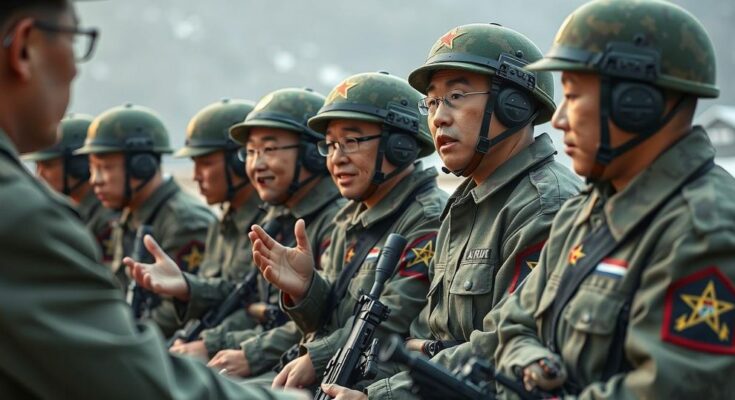Former North Korean soldiers share their harrowing experiences of hunger and lack of training during military service, illuminating the conditions of troops now deployed in Ukraine. Despite reported high morale among these soldiers, challenges such as malnourishment and inadequate combat preparation prevail. Troops exhibit loyalty and ideological fervor that could render them unexpectedly effective, complicating prospects for defections as they navigate battlefields conditioned to fight for their regime.
Haneul, a former North Korean soldier, recalls the debilitating hunger that characterized his military service, with many soldiers experiencing severe malnutrition. Even after being deployed, food shortages persisted, limiting nourishment and severely impacting morale. His experiences, alongside those of other defectors, provide insight into the conditions of the approximately 11,000 North Korean troops now assisting Russian forces in the conflict against Ukraine. Despite their reported elite status, intelligence indicates a lack of modern combat understanding among these soldiers, who have been trained under harsh conditions with inadequate food resources. However, many soldiers are highly motivated, coming from working-class backgrounds, which fosters strong loyalty to their regime. Additionally, language barriers present significant challenges in communicating during combat, further complicating their effectiveness. Despite their limitations, the sheer numbers of troops could play a role in the conflict, as North Korea may have the capacity to send far more soldiers. The complexity of their situation poses questions about potential defections or resistance, given the ingrained ideological conditioning they endure.
The involvement of North Korean troops in Russia’s war against Ukraine stems from a broader strategy by the North Korean government, led by Kim Jong Un, to project military strength while supporting an ally. As intelligence reports indicate, North Korea is utilizing its elite Storm Corps, although these soldiers face challenges such as severe malnourishment and limited preparedness for modern warfare. This scenario draws attention to the plight of individuals serving under tyrannical regimes, illustrating the direct impact of political decisions on the lives of soldiers who may be thrust into dangerous conflicts without adequate means to survive or succeed. Furthermore, the historical context of famine and military training in North Korea adds depth to understanding these soldiers’ current circumstances.
In conclusion, while North Korean troops deployed in Ukraine under Russian command may be perceived as poorly equipped and trained, their loyalty and ideological conditioning could lead to a surprising degree of effectiveness. The complexities of their situation, including food shortages, training inadequacies, and the potential for significant reinforcements from North Korea, warrant caution against underestimating their capabilities. Additionally, the socio-political landscape from which these soldiers hail could pose challenges for Ukrainian and South Korean efforts to dissuade them from fighting or encourage defections, given the deep-seated animosities and indoctrination they have experienced throughout their lives. Ultimately, the situation remains dynamic and warrants close observation.
Original Source: www.bbc.com




